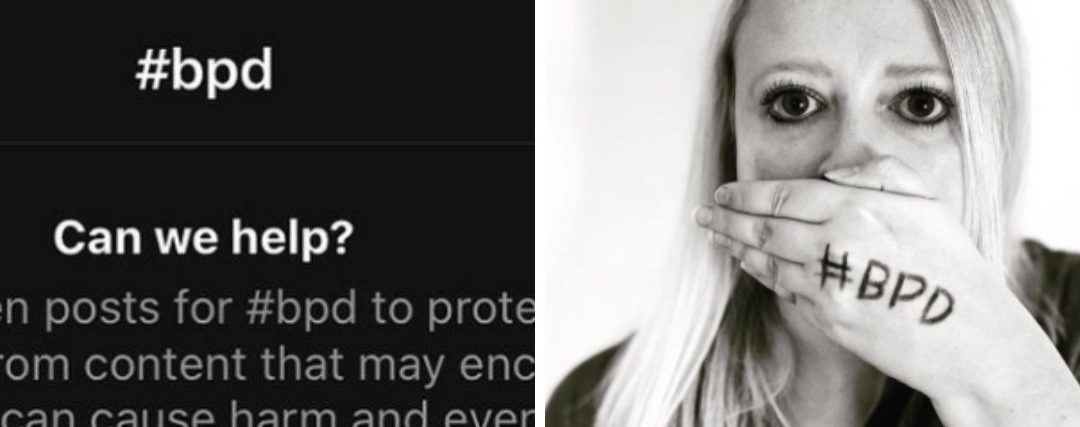TW: This post includes talk about self-harming and suicide.
Concerns have been raised in the online mental health community about the news that Instagram has recently placed a warning message that appears when people search the site using the hashtag #BPD.
If you are looking to connect with other people who have BPD or find BPD resources that might be helpful to you, here’s what you will see on Instagram if you enter #BPD as a search term:
“Posts with words or tags you’re searching for often encourage behavior that can cause harm and even lead to death. If you’e going through something difficult, we’d like to help.”
You have the option of clicking a “Get Help” button that provides a few very basic suggestions for what you might do if you are experiencing an emotional crisis – talk to a friend, call a helpline, or find ways to help yourself including drink water, eat, take a shower or leave wherever you are. Helpful, but very limited.
The #BPD search restriction was put up without any previous notice from Instagram (which is now owned by Facebook). A number of people who have experienced this saw it as discriminatory and arbitrary, adding more unfair stigma towards the millions of people who live with the pain of BPD every day.
A number of well known mental health media outlets weren’t happy about it either:
Here’s what the UK advocacy organization The Mighty had to say:
“While a current search shows more than 1.3 million posts attached to the hashtag on Instagram, the landing page now shows an error message that says the link may be broken or the page has been removed. People in the U.K. got the message the page was removed because of unsafe content.” Read more here
The progressive online news outlet Vice chimed in as well:
“Banning #BPD seems like an odd and confusing move, particularly when the hashtag relates to the condition itself, and is commonly used by people hoping to find information and support. Read more here.
And Instagram user Carley Ward re-posted an online petition using the US based Change.org platform to get people to sign-on if they support her premise that:
“For many the hashtag enables those who suffer with this debilitating illness to access support from fellow sufferers and raise awareness of a condition that is widely stigmatized.” Read more here
Self harming behaviors and suicide ideation are well known risks among people who have Borderline Personality Disorder. In fact, those risks were what inspired are at the root of, Marsha Linehan’s ground breaking and highly effective Dialectical Behavior Therapy (DBT) treatment for BPD.
In addition to Borderline Personality Disorder, many other mental health conditions pose the risk of suicide and self harm including depression, substance use, psychosis, anxiety, eating disorders and trauma.
We searched Instagram and found this same warning for #depression, #drugs, #eatingdisorder. However, the warning does not appear when hashtags for mental health issues such as #schizophrenia, #psychosis, #anxiety, #PTSD, #OCD, #PMS, #postpartumdepression, #narcotics, #GAD, #substanceabuse and #alcoholism are used.
There is also no warning for #guns despite firearms being the most commonly used fatal suicide method in the US according to the American Association of Suicidology.
Looking further into this whole issue we came across interesting research on the potential value of social connection as a positive factor in suicide prevention. A 2016 Dutch study found that having a greater number of social connections may be more helpful than harmful to people struggling with thoughts about ending their life. Perhaps Instagram should consider this and revisit their no doubt well-intended but ultimately misguided policy restricting social access to people seeking understanding and support for their emotional difficulties. (Int J Environ Res Public Health. 2018 Sep; 15(9): 2028.)
We would like to know what you think about this issue so please add your thoughts in the Comment section below.
We’ve also added a quick Twitter survey as well.
In either case your survey responses will remain anonymous.
x
Signup for BPD Updates
[wpforms id=”27400″ title=”false” description=”false”]



